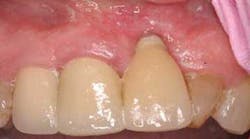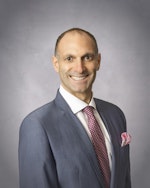Peri-implant mucositis is characterized by an inflammatory reaction in the tissues surrounding a dental implant with no sign of supporting bone loss. Most of the literature suggests that this disease process can be resolved with nonsurgical treatment consisting of scaling and root planing with or without local and/or systemic antibiotics. As clinicians, we are trained to believe that achieving disease resolution is tantamount to giving the patient a successful result.
Is this true when disease resolution is achieved, but esthetics are sacrificed and the patient is unhappy? Can this type of dissatisfaction be precluded by informing the patient of the potential esthetic outcome prior to treatment initiation and allowing the patient to become part of the decision-making process? Absolutely.
In the case of peri-implant mucositis, patients typically present with increased probing depths, bleeding, possible suppuration, no radiographic evidence of bone loss, and usually no pain (figure 1). When faced with this situation, the dentist or hygienist confidently tells the patient that studies suggest nonsurgical therapy with or without antibiotics will achieve resolution of inflammation (figure 2).
Treatment is initiated and the inflammation resolves (figure 3), leading to a successful outcome. The problem with this scenario is that the patient was never told that soft-tissuerecession may occur shortly after treatment or months later, and now he or she suffers from abutment and/or implant fixture exposure (figure 4).
If the patient was told about this possible outcome prior to treatment, agreed to undergo therapy, and the tissue does in fact recede, you have a successful result and you are a clairvoyant. If, on the other hand, the patient was not told about this unaesthetic possibility and the result is unexpected, you may have an unhappy patient calling you a charlatan and demanding reparation.
When treating peri-implant mucositis, it is imperative to let patients know prior to therapy that tissue recession can be a result of treatment and that they must consent to this possible outcome.
MORE CLINICAL TIPS FROM DR. SCOTT FROUM . . .
'Help! My implant fell out!'
'How much do you charge for an implant? I just want to know the price!'
‘The implant you put in my mouth is now bleeding; what should I do?’
After a tooth extraction, are you guilty of chucking the tissue?
It's 10 p.m.; do you know where your patient's hemostasis is?
'If I choose the dental implant option, how long do you guarantee it?'
So you shot a lion and you are public enemy No. 1: Now what do you do?
Saving teeth: They must not teach that as the first therapeutic response in dental school













